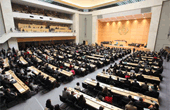EEUU and Russia united against destruction of remaining smallpox viruses
Published on Tue, 2011-05-17 08:27
Sources: AP, Wall Street Journal, NY Times, TWN. The Sixty-fourth World Health Assembly will discuss this Thursday in Geneva, for the fifth time, the destruction of the remaining smallpox virus samples that U.S. and Russia keep alive arguing they will be necessary in case of a breakout or a "bioterrorist attack". The Third World Network is lobbying for the destruction, while Keiji Fukuda, assistant director-general of the World Health Organisation (WHO) said that "the chance of an outbreak is reasonably low, but not zero". "There is a consensus to destroy the viruses, so how come we’re in this situation where we’re pandering to the U.S. and Russia?" asked Lim Li Ching, a biosafety expert and researcher for the Third World Network. "At the end of the day, it comes down to a regulatory issue," said Lim Li Ching. "From a public health perspective, all the goals the World Health Assembly authorized research for have been achieved." Oyewale Tomori, a virology professor at Redeemer’s University in Nigeria, said most African countries want smallpox destroyed. Tomori also sits on a WHO Advisory Committee on smallpox. "Africa is one part of the world where a biological attack with smallpox is likely to have a more devastating effect," he said. "We fully agree that these samples should -- and eventually will -- be destroyed," , U.S. Health and Human Services Secretary Kathleen Sebelius wrote in a commentary published last month in The New York Time wrote. "However, we also recognize that the timing of this destruction will determine whether we continue to live with the risk of the disease re-emerging through deliberate misuse of the virus by others." "It is quite possible that undisclosed or forgotten stocks exist. Also, 30 years after the disease was eradicated, the virus’ genomic information is available online and the technology now exists for someone with the right tools and the wrong intentions to create a new smallpox virus in a laboratory," she added. Sebelius column "was most notable for how non-notable it was," wrote last week Edward Hammond in an InfoBrief for the Third World Network and smallpoxbiosafety.org. "The US has no new reasons for retention of smallpox stocks, and continues to use the same old tired arguments that it has put forth for more than a decade. All of these claims have been debunked time and time again, most recently by the Advisory Group of Independent Experts to review the smallpox research programme.Notwithstanding the reality that there is no longer any essential public health purpose for the smallpox stocks, meaning that the time to destroy them has certainly arrived, what would happen if at the end of 64th World Health Assembly the US and Russia still refused to acknowledge this simple fact and still sought to block a resolution to fix a new destruction date and withdraw authorization for research." "A non-decision or mere taking note of the Secretariat’s report by the WHA would result in smallpox stocks being retained for no purpose," Hammond added. "Prior resolutions authorizing continued temporary retention (with no destruction date set) would remain controlling, and with no new date for destruction set, the US and Russia would not be compelled to destroy the viruses. At the same time, however, as WHO’s public health experts have effectively concluded that there is no essential public health research utilizing variola virus that remains to be done, justifying any new research projects would be difficult." "It is crystal clear, however, that for many years at each point that the United States and Russia have been given any new mandate to continue to temporarily retain the virus stocks that this mandate has been abused, and that neither country has been willing to destroy the virus stocks when the mandate has been fulfilled (either a date or, at present, a research programme),", Hammon concluded.
Nils Daulaire, director of the Office of Global Health Affairs at the U.S. Department of Health and Human Services and the U.S. representative on the WHO s executive board, assured that the research would be shared with other countries, not just kept for U.S. defense purposes .
WHO remains concerned about the possibility of smallpox’s return. With the new vaccines and drugs, Fukuda was optimistic any smallpox outbreak would be stamped out relatively quickly though acknowledged any new cases might spark global alarm. "If smallpox were to reappear, we would be in a much better situation than in the past, considering the vaccine supplies and strategies that have been demonstrated to work," he said. He guessed that stamping out a smallpox outbreak would be faster than the four months it took to mostly end the 2003 global outbreak of SARS, where doctors could only isolate patients and trace suspect cases. With smallpox, Fukuda said countries could quickly vaccinate people in surrounding areas and that drugs could be sent to treat patients. Fukuda said many rich countries like the U.S. have their own smallpox vaccine stockpiles. WHO also has at least 30 million doses for poor countries in case the virus re-emerges, but that supply uses older vaccines that can trigger AIDS in people who have HIV. David Evans, a smallpox expert at the University of Alberta, thinks it’s unlikely terrorists would resort to smallpox in a biological attack. "If you want to disrupt countries, there are lots of easier ways to do it than to experiment with something so dangerous," he said. More information on Third World Network site: http://bit.ly/iz6cM |
SUSCRIBE TO OUR NEWSLETTER



